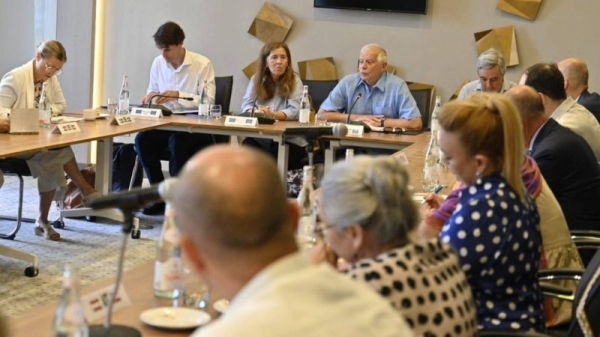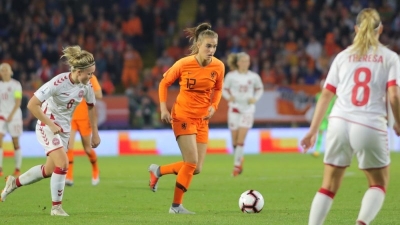EU remains Cuba´s top trade partner, committed to ‘mutual respect,’ Borrell says

The European Union´s top diplomat said in Havana on Thursday (25 May) that the 27-member bloc remains Cuba´s top trade partner, and one committed to “mutual respect” despite US sanctions and the communist-run island´s increasing overtures towards Russia.
EU foreign policy chief Josep Borrell, during his first public appearance on a four-day trip to Cuba, told a group of local entrepreneurs the European Union was also the second-largest source of tourists to Cuba, behind Canada.
Vuelvo a la Habana en mi primera visita como Alto Representante de la UE para co-presidir el tercer Consejo conjunto entre la UE y #Cuba establecido por el Acuerdo de Diálogo Político y Cooperación. pic.twitter.com/V7vdxLZZ61
— Josep Borrell Fontelles (@JosepBorrellF) May 25, 2023
“Despite all the limitations the restrictive measures of the blockade, which does not make things easy, we are [Cuba´s] principal trade partner,” Borrell said.
The United States imposed a trade embargo on Cuba shortly after Fidel Castro´s 1959 revolution, a relic of the Cold War which continues to complicate financial and banking transactions with the Caribbean island nation.
Such sanctions, Cuba says, have contributed to its recent drive to increase commercial and trade ties with Russia, which has also faced sanctions from both the United States and the European Union following its invasion of Ukraine.
Cuba has said Russia is not responsible for the Ukraine conflict, blaming the United States instead.
Borrell, who spoke with entrepreneurs and fellow European diplomats Thursday, said “it is clear that we are much more important [in terms of trade] than other partners such as Russia and China.”
He said the EU accounted for about one-third of foreign trade on the island, “versus 8% by China or 8% by Russia.”
Borrell announced during his talk with entrepreneurs a €14 million fund to help promote small business in Cuba, a sign of the EU´s “desire to accompany Cuba in its process of … economic and social reforms in a relationship of mutual respect,” he said.
The European Union, a long-time trade partner with Cuba, has previously expressed concern over human rights on the island following anti-government protests in July of 2021, the largest such demonstrations in decades.
Borrell said on Thursday that he hoped to meet with Cuban officials to discuss human rights before the end of 2023.
Russian initiatives
Top Russian officials have flocked to Cuba this year, starting in March with Nikolai Patrushev, Moscow’s secretary of the Security Council, alongside the executive director of state oil company Rosneft, Igor Sechin.
A representative of Russian business owners, Boris Titov, also visited.
The most high-profile visit was from Foreign Minister Sergey Lavrov in April on a week-long trip to Latin American allies, including Venezuela and Nicaragua, which like Cuba and Russia are the subject of Western sanctions.
“Russia needs trading partners and political allies, with Latin America offering the possibility of both,” Mervyn Bain, from Aberdeen University in Scotland, told AFP.
Last week, Russian Deputy Prime Minister Dmitry Chernyshenko drew up a road map to accelerate cooperation with Cuba.
The two countries have signed around a dozen agreements to relaunch trade relations in construction, information technology, banking, sugar, transport and tourism.
“But to what level” this cooperation can go “is unclear,” said Bain, an expert in Russia’s relationships with Latin America.
Chernyshenko’s plan also referenced Cuba’s need to change certain laws to loosen restrictions on private enterprise.
Cuba has announced the reopening of direct flights between Moscow and the seaside resort of Varadero, and Russian tourists have been able to use the Russian Mir payment system in the country since March.
‘Not the USSR’
The Russian visits to the Caribbean island nation have come only months after Cuban President Miguel Diaz-Canel visited his Russian counterpart Vladimir Putin in Moscow.
The two communist entities were close allies during the Cold War, but that cooperation was abruptly halted in 1991 with the dissolution of the Soviet bloc.
Until then, 75% of Cuba’s commercial exchanges were with its communist ally.
Having almost ended completely, relations started picking up again from 2005, with the current levels of exchange the highest since then.
According to Russian figures, commercial exchanges between the two countries reached $450 million in 2022, with 90% of that in sales of oil and soybean oil to the island nation.
The strengthening of ties is paying off for Russia in geopolitical ways.
Havana had maintained a position of neutrality over Russia’s invasion of Ukraine, abstaining from United Nations votes on the issue.
But this week, Diaz-Canel assured Chernyshenko of “Cuba’s unconditional support” in its “clash with the West” and on Wednesday, Havana voted against a World Health Organization resolution condemning Russian attacks on Ukrainian health systems.
However, the aid that Russia can supply Cuba is limited and “nothing like” that which the Soviet Union furnished during the Cold War, according to Vladimir Rouvinski, an academic at the ICESI university in Cali, Colombia.
“Putin’s Russia is not the USSR … nor is Putin interested in spending millions of dollars keeping Cuba within the Russian orbit, and Russia doesn’t have the money to do so anyway,” said Rouvinski, who is an expert on Russia’s relations with Latin America.
While Moscow may not be spending the big bucks any time soon, Rouvinski said that the West’s unconditional support for Ukraine means “the attraction of Cuba for Putin’s Russia is its geographic proximity to the United States.”
“It’s the logic of symbolic reciprocity,” because “any mention of the possibility of having a Russian military presence on the island provokes great nervousness on the other side of the Florida Strait.”
Read more with EURACTIV




